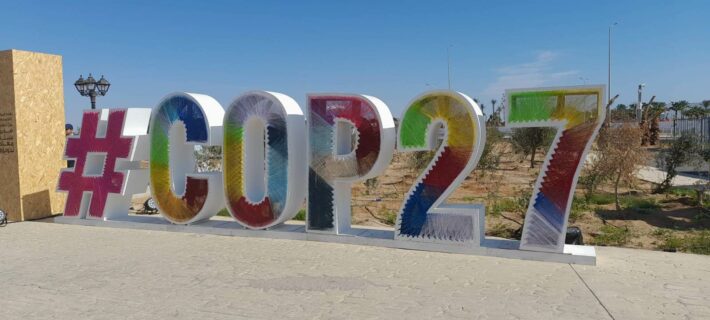INDIGENOUS PEOPLES’ TRADITIONAL KNOWLEDGE AND OCEAN CLIMATE ACTION

The stories and experiences of knowledge holders from Namibia, Madagascar, Ghana, and South Africa, albeit not physically present at COP27, contributed to highlight how their knowledge, perspectives, and action are crucial to shaping the future of our ocean and climate. Participants who listened to these stories reflected on rights, responsibilities, responses and representation at the UN Climate Summits and in other decision-making processes relevant to the ocean.
See the event recording here.
“It is what we think about when we wake up and dream about when we fall asleep.”
– Symphorien Nihala Maniry Soa
“The government recognises us, but this is not enough.”
– Herman Areseb
“The intellectual and scientific minds of our forebears that is now restricted to us.”
– Chrissila Billings
“Indigenous Peoples have been uprooted from our lands due to discriminatory policies or armed conflict.”
– Chief Brendon Billings
“The work of men would be in vain if women do not purchase their fish.”
– Peace Gavor Abla
During the COP27 Virtual Ocean Pavilion, this panel focused on listening to the stories and experiences of knowledge holders from Namibia, Madagascar, Ghana, and South Africa. These were voices who were not present at COP27 and yet whose knowledge, perspectives, and action are crucial to shaping the future of our ocean and climate.
As each speaker discussed, Indigenous and traditional knowledges often remains marginalised from international and national dialogues shaping the future of our ocean and climate. This does not mean, however, that action is not being taken at a local level, as each speaker also explained some of the approaches that they have taken in response to climate change and related issues.
Herman Areseb and Glen Kasper who spoke on behalf of the Topnaar community, Namibia. Herman and Glen shared the long history of the Topnaar’s connection to the coast and sea, explaining that this was taken away from them as a result of forced dislocation and restricted access. Government rules and regulations mean that it continues to be difficult for the Topnaar community to access the ocean, especially when their rights are not recognised or are severely limited.
Symphorien Nihala Maniry Soa, speaking on behalf of Blue Ventures and Vezo communities, Madagascar, in this short video, explained Vezo’s close relationship to the sea and how Vezo culture aligns with ocean protection and appreciation. He also outlines the challenges Malagasy communities face when it comes to legal barriers and potential knowledge loss.
Watch Symphorien’s video here.

Chrissila Billings, a Khoisan traditional healer, and Chief Brendon Billings of the Damasqua Kei Korana, South Africa, in this recording, discussed their rich spiritual, cultural, and historical connections to the ocean, while also stressing the long history of dispossession and marginalisation through forced removals, exclusion from decision making, and restricted ocean access.
Watch Chrissila and Brendon’s video here

Peace Abla Gavor, fish worker and Central Region Chairperson of the Ghana National Fish Processors and Traders Association (NAFPTA), Ghana, in this video, emphasised the knowledge and influence of fish traders and processors, while explaining the many challenges facing women within the fishing industry due to exclusion from decision-making, subsidies, and leadership.
Watch the video here.
Peace Abla also appears on this ‘Ocean & Women film – watch it here.

The ensuring discussion focused on the key takeaways learned from listening to the presentations:
Rights. The importance of a human rights framework, particularly surrounding the rights to participation in decision-making and equality for women, in supporting the elevation of the voices of Indigenous Peoples and Local Communities, especially women and youth, within decision-making at both a national and international level.
Responsibilities. The responsibility that we, as ocean researchers, hold to create the spaces and capacity whereby different types of knowledge surrounding climate change adaptation can be advanced on an equal footing, in which these are each recognised as legitimate sources to inform regulation and practices, rather than continuing to enforce unequal and discriminatory hierarchies of knowledge and law.
Responses. Recognising the vast differences between contexts at both a regional and national scale and how this shapes responses to climate change and related challenges. Each speaker spoke to specific challenges and opportunities within their contexts, all of which surrounded ocean-climate action and deep connections to the oceans in one form or another, but which were distinctly place-based and shaped by different histories and experiences. These variations, including distinctive national frameworks, has then informed local responses to climate change and related challenges and has also led to differing levels of capacity of each group to inform decision making at a local, national, and international level.
Representation. Representation in decision-making forums is essential. As we have seen, COP27 was difficult to access in terms of time, resource, capacity, and logistics, especially for Indigenous Peoples and Local Communities. More effort needs to be put in place to ensure increased representation at international decision-making events and forums, to make sure that these are in fact inclusive and equitable. Governments supported by international organisations must commit to ensuring that decisions on climate action are inclusive and equitable by ensuring that Indigenous Peoples and Local Communities can contribute to decisions on the ocean.